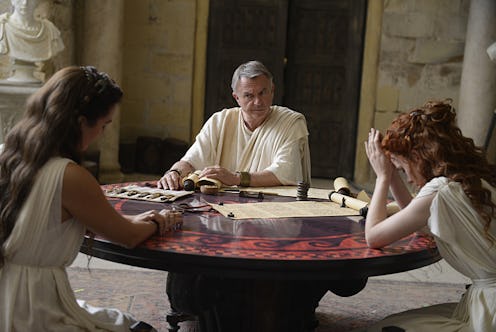Entertainment
'The Dovekeepers' Is A New Take On An Old Tale

CBS' limited historical series The Dovekeepers may not take on the entire story, but that doesn't mean it's not an ambitious adaptation. The Dovekeepers is based on Alice Hoffman's novel of the same name, which was inspired by the real-life account of The Jewish War and siege of Masada. According to some texts, this struggle was between the Roman Empire and Jewish people living in Israel, and culminated in a prolonged attack and the suicide of 960 Jewish rebels. Since this would have happened in about 70 AD/CE, there's no undisputed account of what happened in Masada.
But there's one text that stands above all others — the writing of Flavius Josephus. Josephus is portrayed in the TV series by Sam Neill. A little background: While Josephus was a Roman defector, at the end of his life, he painstakingly accounted the resistance of the Jewish people as the Romans bore down on their settlement in Masada, a city on a cliff in ancient Israel. Josephus claimed that Masada's inhabitants resisted until their last moments, when they committed mass suicide and allegedly set their city ablaze as Romans entered their fortress. It's all collected in The Wars of the Jews , Josephus' most well-known text from between 75 and 79 CE.
But Josephus' account isn't uniformly accepted. As The Independent reported back in 1997, it's highly possible that there was no such mass suicide at Masada; the geographical evidence at the site actually doesn't support the alleged 960 deaths of the Jewish commanders and their families. According to The Independent's report, Professor Yigael Yadin, an "archaeologist and former chief of staff of the Israeli army" who lead excavations of Masada in the '60s, "was anxious to find bones of the 960 defenders and their families." But instead, only "the remains of three skeletons were found, identified as a man aged 20-22, a woman of 17-18 and a child of 11-12." Not exactly the stuff the legend alleged.
From the trailer, it seems like the biggest stretch in the miniseries comes when Josephus promises that he'll tell the story of the women of Masada, who serve as The Dovekeepers' main characters, and that he's only interested in "the truth." Hmm... Look, I don't want to throw stones at a dude who's been dead for a few thousand years, but in Josephus' complete The Wars of the Jews, I don't see any mentions of the women, who here, are at the center of The Dovekeepers.
Because Josephus wrote in an ancient Abrahamic language, all published copies of the account have been translated into modern languages, so maybe Hoffman's idea is that the stories of Masada's women are simply lost in translation. To remedy this, The Dovekeepers takes Josephus' account of The Jewish War and gives it a female perspective by focusing on three different women. In the CBS adaptation you'll meet Aziza, who wishes to be a warrior, but has to disguise herself as a man. There's also Shirah, who would probably be a religious leader if she was a man, but instead, her divine powers are considered witchcraft. Finally, Yael has to flee to Masada because of her dark past.
So Hoffman's book is, in a way, a feminist translation of Josephus' text, a text that largely ignores women; its focus is on the men of The Jewish War, the Roman emperors, and the Jewish rebellion leaders. Hoffman's characterization of the women as politically powerless, but still significant to ancient Jewish society, is important and worthy of a TV adaptation — regardless of how historically accurate or not accurate Josephus' original text actually is.
Image: CBS